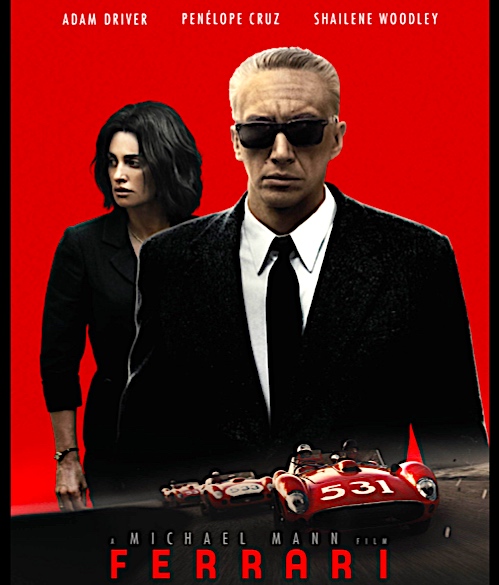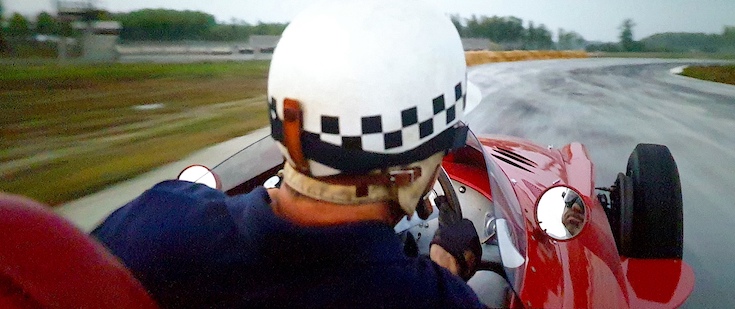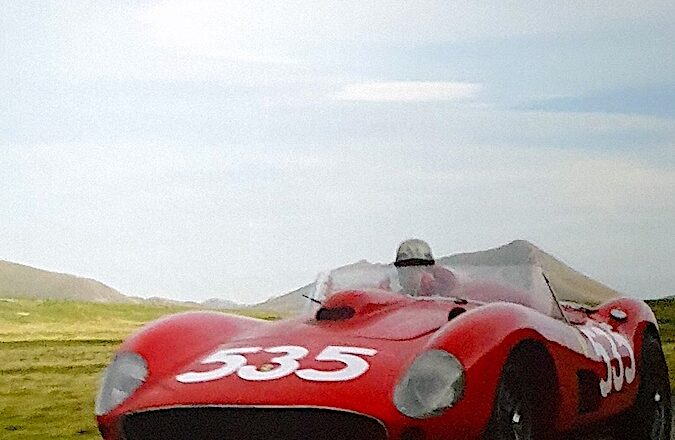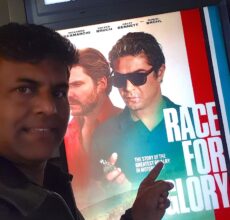My passion for cars and movies are together celebrated in road and racing movies. At the “Need for Speed” festival at Roxy Cinemas, I watched a bunch of movies that tell the story of racing icons or iconic rivalries. The new movie Ferrari is remarkable as the story of a man and a machine – both legends.

The making of movies about races and racers is vastly diverse. Some are essentially documentaries that are true to the details but sprinkled with situations or dialogues that are ‘overheard in the screenplay writer’s dream’ in order to build cinematic bridges. For example, “Race to Glory: Audi V Lancia” that is now showing in the theatres. (Read my review here.) Then there are some, based on facts yet built on the emotions fuelling the lives involved, beyond these facts.
Set in the genre of sport thrillers, the new Ferrari movie has no dearth of action or drama, just as in the life of Enzo Ferrari, and by staying focused on the human emotions behind a corporate quandary, a power transfer, a treacherous race and the economics of marital deception, this movie by veteran director Michael Mann promises to be an automotive classic.
The maker of Heat and The last of the Mohicans blends his seasoned skill and ripened wisdom to portray the two sides of each topic dealt with in the movie. To begin with, ‘Ferrari’ is both the man and the machine in the eponymous movie. The movie tells the story of Enzo as faltering-man and revered-superman (who is even addressed as Commander). It portrays his machine as the celebrated ‘jewel in the crown’ and national treasure of Italy, and then lays it in smithereens as vulnerable metal that is at the mercy of a blurred decision or a stubborn thorn in the path.
The plot deals with a crisis in Enzo’s personal life as well as in the company he and his wife Laura together built. In order to sell more of the beautiful cars they build and generate interest among investors, Enzo Ferrari is advised to impress the world by winning the Mille Miglia race. Famously beautiful (It was Enzo Ferrari that called it ‘the most beautiful race in the world.) and notoriously treacherous, the race leads to the climax of the movie, which ends in the celebration of winning on one side and mourning the loss of more than ten lives in one of the most tragic accidents in racing history. Enzo Ferrari tells winner Piero Taruffi on a call that ‘aside of what happened that day, he would like to congratulate him’ on winning the Mille Miglia for Ferrari. It is a commentary on how grief and lamentation are distinct parallel streaks as joy and celebration, both in the realm of racing and in the race of ambition. Mann captures this with brutal nonchalance in an initial scene where Enzo Ferrari is shown as watching the fatal accident of his team driver but wasting no time in recruiting De Portago – for the race must roll on.

This dualism of life is seen all through the movie and its various threads. While grieving his son Dino’s loss to a terrible illness he is unable to acknowledge the presence of another heir from his mistress, for fear of hurting his wife. For Laura, as Enzo’s wife and partner in building the epic company, life isn’t easy putting up with her philandering husband and the loss of her son. Her share of dualism in the movie peaks in her (perhaps) vengeful breaking of a promise to her husband that threatens the very existence of their company with bankruptcy. And yet, almost immediately, she gives it all away to support Enzo Ferrari, unconditionally, despite having to face the fact that she has shared most of her life with a strange woman without knowing it. Seasoned actress Penelope Cruz has carried off Laura commendably well. I would especially pick the scene at the sepulchre, in which her face in frame morphs from the suggestion of a greeting smile to a grieving mother’s profound question to the universe – “But why?” Brilliantly done!
As for historical accuracy followed in the screenplay, there are chronological and contextual adjustments made for the sake of story-telling. An instance is the portrayal of the death of Luigi Musso, who De Portago replaces. Both he and his teammate Peter Collins were killed in similar fashion during a race just a few months apart but that happened in 1958, more than a year after De Portago himself died in the crash that killed nine spectators and put a full stop to the Mille Miglia race as they knew it then. The portrayal of the fatal accidents is graphic and, needless to say, somewhat exaggerated. However, an accident like De Portago’s that took place at 240 kmph would have been no less dramatic to begin with and the carnage actually involved a body split into two as reported. The dualism of Mann captured well on camera by Erik Messerschmidt allows viewers to trepidate in thrill with the experience of speed and shudder in abomination in the face of annihilation.
The balance of emotional drama and thrilling action makes Ferrari a gripping watch as well as a reasonably accurate narration of automotive history, which makes it a celebration of Mann, man and machine.
NEED FOR SPEED Film Festival by Roxy Cinemas from 17 to 28 January 2023













